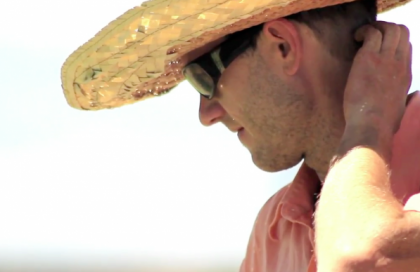Some of the best ideas come from the simplest, most obvious solutions. When we hear Russell talk about the beginnings of Transition Lab - a seed of an idea that has blossomed into an award-winning model - it seems so refreshingly clear. I suppose what impresses us most is that he took that simple idea and made it happen. And now many other folks can benefit from it, too.
When did you know that you wanted to work in food?
I grew up in mountain towns with great restaurants, but nothing was grown locally. In my late 20's I moved to a small agricultural community in Western Colorado and started hanging out with the organic farmers. I remember buying 100 lbs of organic potatoes from my buddy Chet and thinking, "Wow, this came from that field over there - And it's going to get my family through the whole winter!" After having that kind of relationship with my food, I could never go back to the old way.
I really liked farming, but I wasn't in a position to grow all my own food because I had a mortgage to pay. Everything changed when we offered our guest bedroom to a friend who was 1) Trying to pay off debt, 2) trained by two Michelin Star Chefs, and 3) Wanted to make a living cooking and gardening. So while my wife and I paid the mortgage, our friend got free rent in exchange for being the family gardener and chef for 15 hours a week. It was such a good deal for all of us because everybody got what we needed - and it couldn't have happened if we were trying to meet our needs in the cash economy.
I started Transition Lab when I realized that I could replicate and facilitate these kinds of relationships. Now we have students who are helping out farming, cooking, and caretaking all across the community - including at Straw Hat Farm where I bought those potatoes. Everybody has their needs met, plus we get to live and work in a real community.
How did your previous work or life experience prepare you for a good food job?
It's funny because I've always loved telling stories with a big group of friends - and usually that happened when we shared a meal together. At Transition Lab, I get to tell stories about how good people can live well with excellent food. And I usually get to tell those stories to great people while eating excellent food. Getting together and eating is a wonderful excuse to have at the center of our lives.
What was the greatest obstacle you had to overcome in pursuing your Good Food Job dream?
The biggest obstacle to creating the world we want to live in is our exclusive participation in the dollar/ debt based economy. There just aren't enough profitable jobs out there for all folks who want to garden or cook for a living. Our biggest breakthrough was realizing that if we could meet our needs in more creative ways, then we could provide the opportunity for all of those people to follow their passions, live rent free, and create the world we wanted to see. Now, students from Transition Lab have all their basic needs met - ( food, shelter, utilities, transportation ) - for 15 hours a week of gardening and cooking. Then they have rest of the week to do whatever else they want- and that gives people the opportunity to deeply pursue ALL of their callings - whether that is paying off college debt, or starting an ice cream business in town.
What can you identify as the greatest opportunities in food right now?
I don't expect farmers markets, or CSA's to ever become more profitable than they are now. What I do see however, is thousands of edible landscapes popping up in every front yard where there is currently Kentucky Bluegrass. The trick is that gardening can't be done by folks who are working to pay the mortgage because they just don't have the resources. However, each of these landscapes could be supported by somebody living in a guest bedroom and providing the food for the host family. The reason that this will succeed is that yards, guest bedrooms, and people looking for the opportunity to garden for a living are renewable resources that never disappear in the same way that our dollars do when we spend them at the supermarket. All we need to do is facilitate those relationships and they will flourish.
If you could be compensated for your work with something other than money, what would it be?
At Transition Lab, we've worked a lot with the local Timebank because many parts of the food economy are better served that way. I'd never pay cash for somebody to weed my garden because I couldn't afford it. But what I have been doing is giving folks the choice of paying either in cash or time hours for the classes they take with us. Then I can spend those time hours to help weeding my garden, plus get a massage now and then. It's a win win win.









